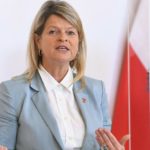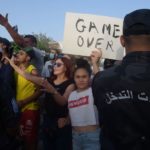TUNIS–Most Western nations, the country’s main creditors, seem to be giving the Tunisian president a cautious nod to implement his announced shift in the political system but seem wary of instability and violence or a sudden halt to the democratic process in the turmoil-stricken North African country.
Washington, Berlin, Paris and Brussels have abstained from talking about “a coup” in Tunis giving Kais Saied a chance to salvage his democratic credentials and firm up his control of the situation despite the denunciation of his moves by Islamist leaders and their Turkish backers.
Their measures words also give the cash-strapped Tunisian government a breathing space as they face tough negotiations with the International Monetary Fund (IMF) and foreign creditors.
Monday, the US projected intense interest in the turbulent situation in Tunisia, the poster child of the “Arab spring”, but did not slam Saied’s moves which removed the government of Prime Minister Hichem Mechichi and froze all activities of the parliament, last Sunday.
Much like other Western powers, Washington seemed concerned that a prolonged showdown between the authorities and the proponents of the now discredited Islamist-dominated old system after Saied’s moves could put an end to the country’s democratic experience and destabilise the small nation south of the Mediterranean.
“We are concerned about the developments in Tunisia,” White House spokeswoman Jen Psaki said at a news briefing.
“We are in touch at a senior level from both the White House and the State Department with Tunisian leaders to learn more about the situation, urge calm and support Tunisian efforts to move forward in line with democratic principles,” she added.
More importantly, Psaki said the White House has not made a determination on whether it was a coup, adding that it was looking to the US State Department to conduct a legal analysis before making a determination. The process would relieve the Tunisian authorities of any immediate pressure from Washington.
The US State Department later announced that Secretary of State Antony Blinken spoke by telephone, Monday, to the Tunisian leader It said he “encouraged President Saied to adhere to the principles of democracy and human rights that are the basis of governance in Tunisia”. Blinken also urged Saied to “maintain dialogue with all political actors and the Tunisian people.”
France on Monday called for respect of the rule of law in Tunisia as quickly as possible and called on all political parties to refrain from violence.
A German foreign ministry spokeswoman said Monday her country was “very worried” about the situation in Tunisia but added: “We don’t want to speak of a coup d’etat”.
The European Union also urged all political actors in Tunisia on Monday to respect the country’s constitution and avoid violence.
“We are closely following the latest developments in Tunisia,” a spokeswoman for the European Commission said.
“We call on all Tunisian actors to respect the constitution, its institutions and the rule of law. We also call on them to remain calm and to avoid any resort to violence in order to preserve the stability of the country,” she said.
At home, President Kais Saied has been busy consolidating his power against potential challengers while avoiding unnecessary frictions or violence. He responded to Western concerns by saying human rights and freedoms were not in jeopardy and implicitly denied any intent to engage in a witch-hunt against businessmen under the banner of fighting corruption.
Although it did not seem to be a prime concern for public opinion, except for the shrinking support base of the Islamist movement, Saied’s decision to invoke Article 80 of the Tunisian constitution late on Sunday has been a matter of contentious discussion among Tunisian jurists.
The issue could have been resolved by the Constitutional Court, a judicial body which the Islamist-dominated parliament has for years failed to set up. After years of squabbling, there has been no consensus on which judges should sit on it. Critics accused Ennahda of eying the formation of a court stacked up with its supporters.
Much of the country’s woes have to do with Tunisia’s 2014 constitution, drafted a result of compromises aimed at averting civil strife, but which split powers between a directly-elected president, a directly-elected parliament and a prime minister agreed by both, but with a fuzzy distribution of powers and snags in all directions.
Successive presidents, prime ministers and parliaments have since then tussled over the extent of their legal powers and most major candidates in the 2019 elections, including Saied, vowed to change the system.
Saied, a constitutional scholar who has been critical of the 2014 document, invoked the emergency powers given by Article 80 in a speech on Sunday.
The article says the president can take necessary measures in exceptional circumstances if imminent danger threatens national institutions, security or independence, a condition Saied said was triggered by protests “endangering social peace” and a COVID-19 spike.
It says any measures the president takes should guarantee a return to normal state functions and that though the president can freeze parliament’s activities, he cannot dissolve it.
However, the article says the president must consult with the prime minister and parliament speaker before invoking Article 80 and inform the constitutional court, which has yet to be set up.
Parliament speaker Ghannouchi denied having been consulted, although he was apparently briefly called by Saied on the matter. Prime Minister Hichem Mechichi has not spoken in public since Saied’s decisions but has announced Monday he has no objection to stepping down.
“In the absence of the constitutional court the president has the exclusive right of interpretation,” said Rabeh Kraifi, a law professor, arguing that Saied’s actions were legal.
“The decisions were completely contrary to the constitution … the condition of imminent danger does not exist and he did not consult the speaker or prime minister,” said another law professor, Iyadh Ben Achour.
Tunisian President Kais Saied rejected scholarly criticism of his move by telling his critics to “review your constitutional lessons.”
Public ire
Jurists have long dominated the Tunisian political scene offering solutions and at times adding further complications to the country’s political rows and to the gap between public opinion and the political elite. This time was no exception.
Scholars could not alter the negative public perception that has developed over the years about the country’s legislative branch.
Parliament has been subjected to most of the public ire. While the crisis escalated and even led to physical violence in the legislature, the people watched. Thanks to public television, they saw the inane legislative process warts and all. The more they watched, the more they lost trust in the parliament and all branches of the endlessly feuding political class. Eleven years on, they also lost patience with the so-called “democratic transition” altogether.
Demonstrators who descended on the country’s streets Sunday called on the president to end the combined social, economic and political crises that have driven the population deeper into poverty and unemployment. Much of the blame went to the Islamist party Ennahda, for its failed leadership of parliament but also of most governments it led since 2011 although the Islamist party refused to accept responsibility for the accumulated fiascos.
In their slogans, the demonstrators reflected the desire of the public to get rid of the ruling class, especially the parliament. “By any means necessary,” was the implicit message.
The president found a way to dismiss the government and sideline the parliament by stretching the provisions of the constitution to fit the political objectives he sought. He himself said laws have no meaning if they did not reflect the will of the people. The protests were sparked by popular despair after months of deadlock and disputes pitting Saied, a political independent, against Prime Minister Hichem Mechichi, who was backed by Parliament Speaker Rached Ghannouchi.
The manifestations of joy and relief of the last few days may be a disappointment for international democratic transition specialists. But they were, according to experts, spontaneous expressions by common people driven to extremes by the inability of the rulers to address the problems of the inadequate health infrastructure and rising poverty and unemployment.

Unless events somehow spin out of control, the army-backed president is expected to find his way to a new transition that is likely to involve early legislative elections based on a new voting rules enunciated by decree, experts say. Saied could also use the wave of popularity he enjoys these days to call for early presidential elections based on a referendum that could transform the essentially-parliamentarian system into a presidential regime, the same experts insist.
The conditional support he received Monday from the powerful trade unions is likely to keep him on track.
This comfortable wiggle room does not however relieve the president from the responsibility of the many crises facing the country including the nearly bankrupt economy and the catastrophic repercussions of the pandemic.
His first test may be his choice of prime minister, widely expected to be a senior economist. As he centralises all executive powers, he will have to worry about the country’s domestic security, if Islamists decide to actively resist the new political order, the off-keel financial balances and the soaring COVID-19 mortality rate, all at once.
He will face an uphill task meeting all these challenges. But he starts his journey boosted by the popular benefit of the doubt and Western powers cautious nod.
Source: Arab Weekly
***Show us some LOVE by sharing it!***



